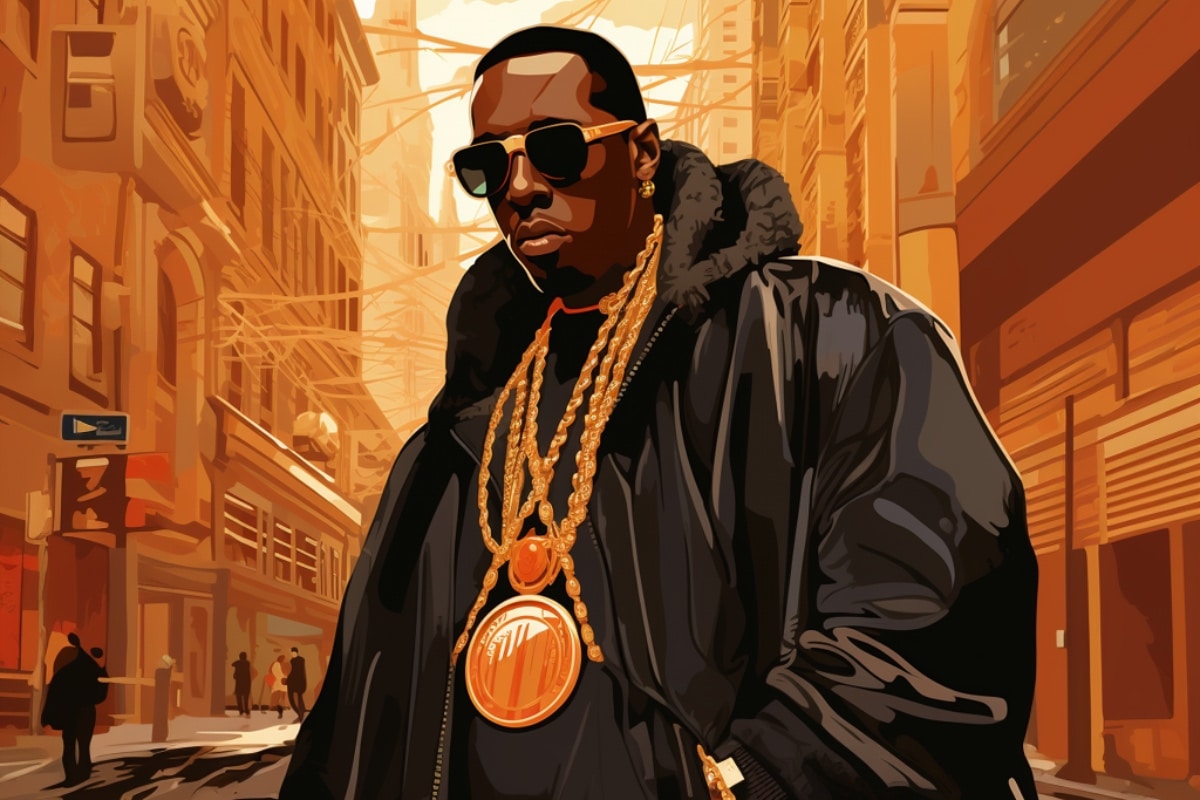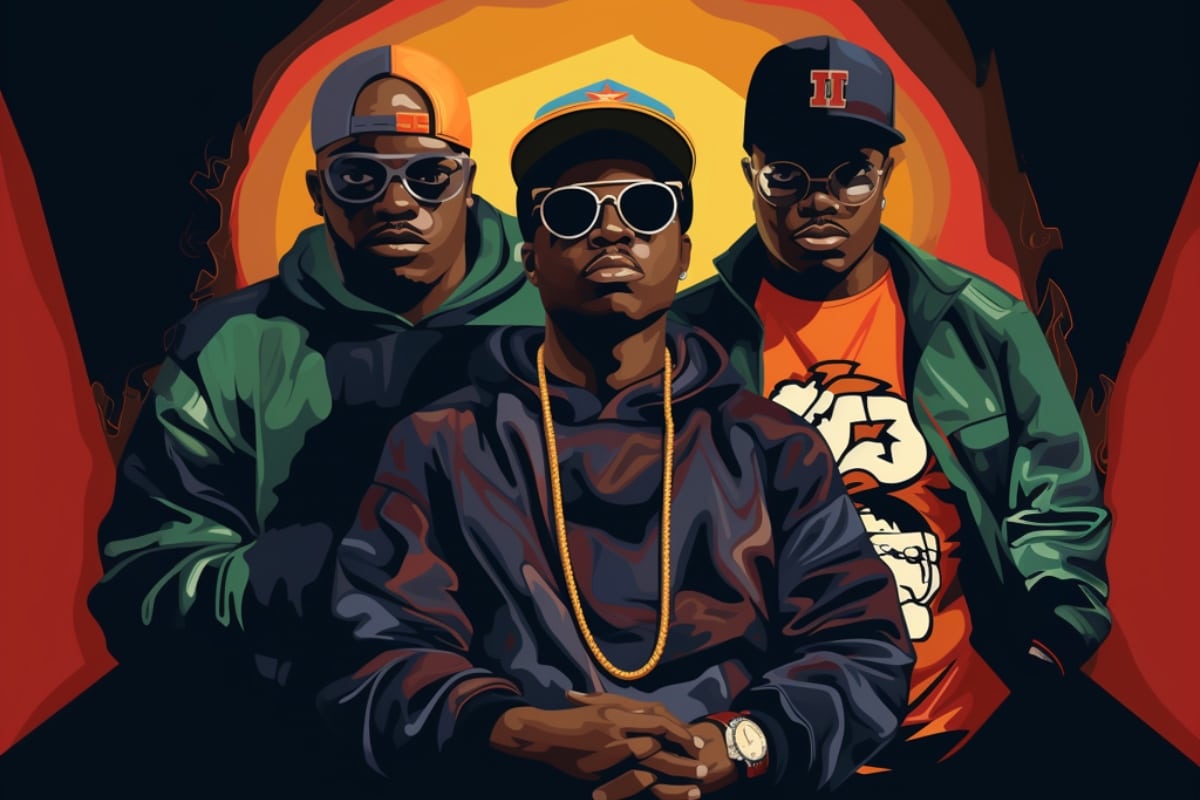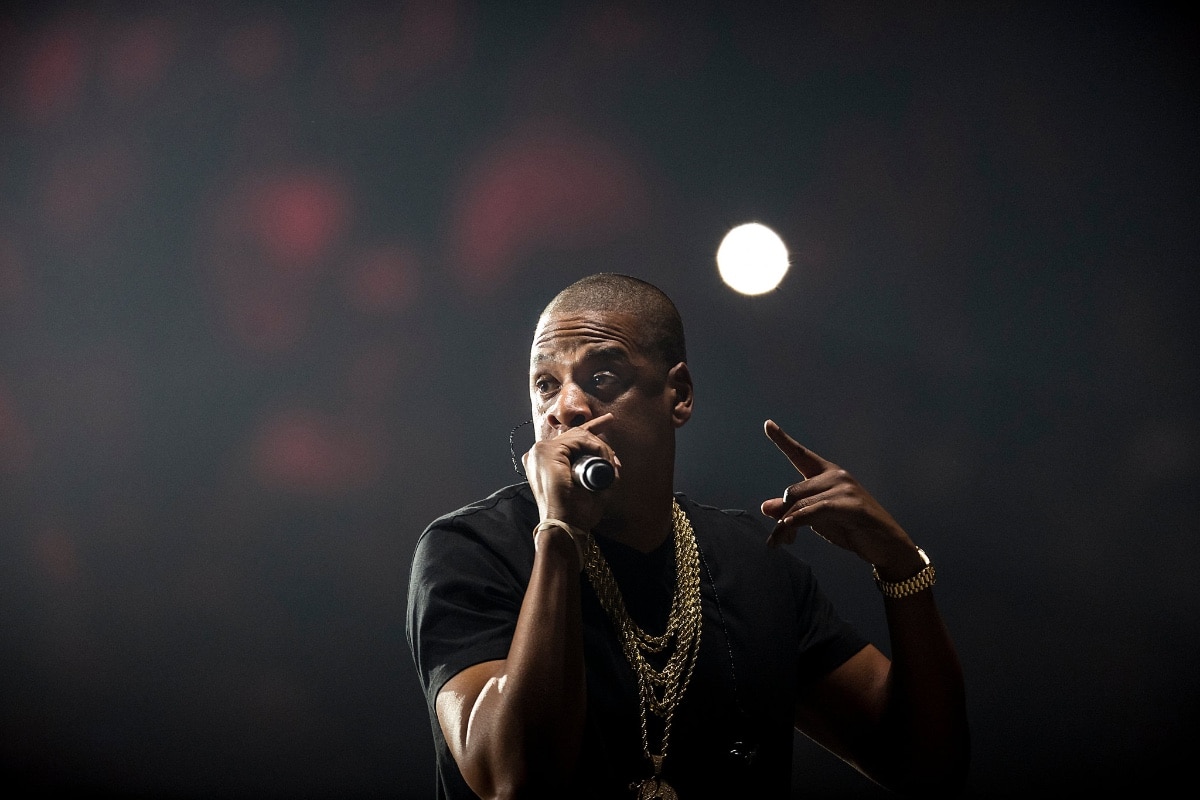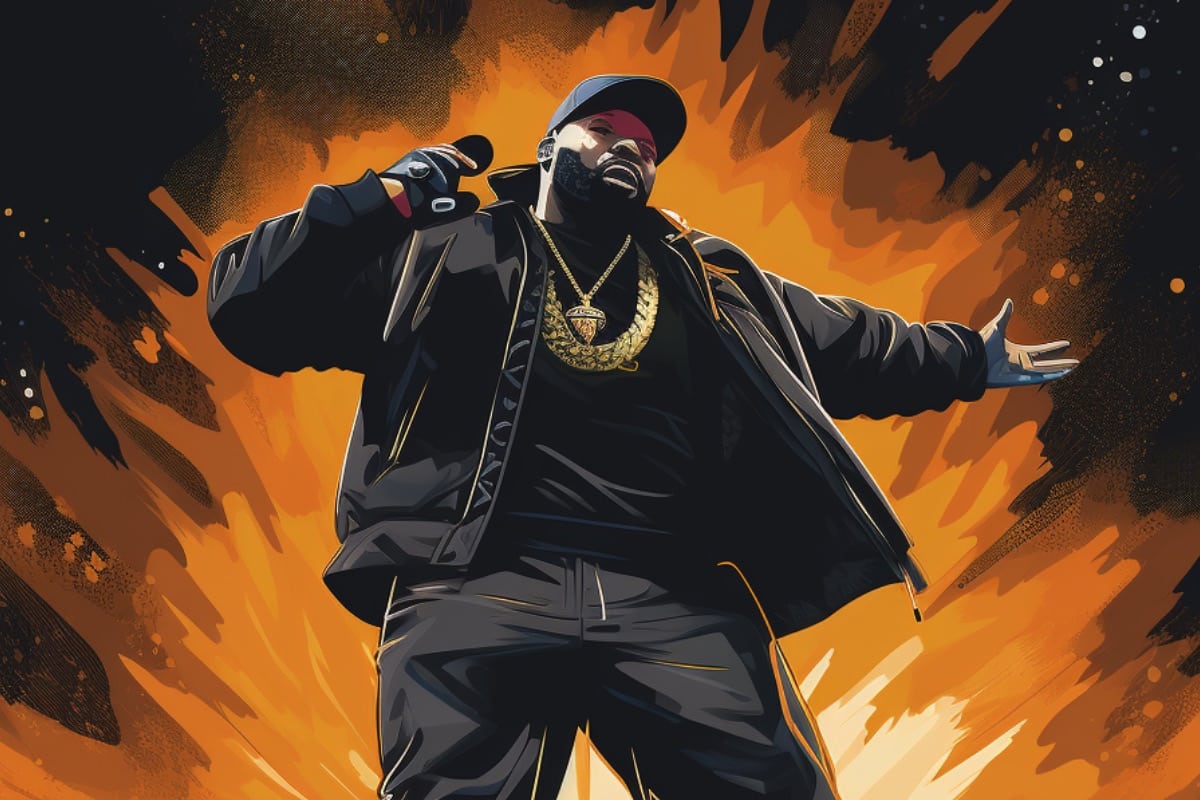The role of record executives, though often shrouded in the behind-the-scenes mystique, is pivotal. These are the tacticians, the silent architects, orchestrating the rise of icons and the birthing of movements that would transcend time and geography.
Dr. Dre, not just a producer with a Midas touch but a visionary who spotted and nurtured talent, transforming Aftermath into more than a record label – a legacy. Russell Simmons, co-founding Def Jam and in the process, cementing an unshakeable pillar in the temple of hip-hop. Jay-Z, from Marcy Projects to the gleaming edifice of Roc Nation, has morphed into a testament of evolution, from artist to mogul.
But it’s not just about the big names and the glittering accolades. There’s the unyielding finesse of Sylvia Robinson, the woman who had the streets and the boardroom on lock, orchestrating the rise of Sugar Hill Records. Irv Gotti, a name synonymous with an era where the anthems of Murder Inc. reigned supreme, was another force of nature, a bridge connecting the raw, untempered energy of the streets to the polished corridors of mainstream success.
So let’s get into it. From rappers-turned-moguls like 50 Cent and Jay-Z to boardroom titans like Dame Dash and Lyor Cohen, here are the 20 greatest hip hop record executives of all time.
20. Sylvia Robinson
Sylvia Robinson was a heavyweight in the game before many knew there was a game to be played. Co-founding Sugar Hill Records, she had the streets and the boardroom on lock, a mix of hustle and finesse that was unheard of at the time. “Rapper’s Delight” and “The Message”? Both classics, both under her belt. She wasn’t just about the business; Sylvia had an ear for the culture, a knack for spotting raw, uncut talent and turning it into gold. In an era dominated by men, she carved out a lane for herself, proving that hip-hop had room for a queen who could build empires while keeping it real with the roots of the culture.
19. Irv Gotti
Irv Gotti, the brain behind Murder Inc., had that Midas touch. In an era where hip-hop was finding its footing, Gotti was already laying down tracks that would echo through time. Think Ja Rule, think Ashanti – that’s Gotti’s handwork. A master of crafting anthems that were as street as they were soulful, he had the game figured out. His approach wasn’t just about laying down beats; it was about narrating the untold stories of the streets, lacing every track with a mix of grit and melody. Gotti was more than a record exec; he was a storyteller, a bridge between the unheard voices of the hood and the glittering lights of mainstream success.
18. L.A. Reid
When you’re talking about moguls who’ve been deep in the trenches and came out with gems, you’ve got to put some respect on L.A. Reid’s name. Man’s had his hands in more classic records than most can count. Co-founding LaFace Records, Reid wasn’t just about the business; he was about cultivating artists, shaping sounds, and delivering hits that defined eras. We’re talking TLC, Usher, OutKast – cultural icons, each with a distinct voice and vibe, but all stamped with the L.A. Reid seal of quality. In a game where execs often fade into the background, Reid’s influence is as bold as graffiti on a New York subway car, undeniable and unmissable.
17. Sylvia Rhone
Sylvia Rhone is the type of exec who doesn’t just clock in; she revolutionizes. With a career that’s seen her flex from label president to CEO, Rhone ain’t just in the building, she’s laying down the foundation. Talk about breaking records and ceilings at the same time. She’s got an ear that’s tuned to the streets and eyes locked on the future, picking out hits like a psychic reading palms. Under her watch, artists don’t just blow up; they ascend, leaving imprints that last generations. In a world of fleeting hits and one-hit wonders, Rhone is the anchor, ensuring that every beat and bar is laced with that timeless touch.
16. Uncle Luke
Uncle Luke is that unfiltered, unapologetic force of nature that turned the hip-hop game on its head. When you’re talking about the 305, Miami bass, and those rambunctious anthems that had the clubs and the streets pulsating in unison, you’re talking about Luke. As the frontman of 2 Live Crew and the mastermind behind Luke Records, he didn’t just push boundaries; he obliterated them. Censorship, norms, the status quo – all were fair game. His roster? As audacious and iconic as the man himself, serving up hits laced with that raw, uncut energy that told the world hip-hop wasn’t just a genre; it was a movement, defiant and uncontainable.
15. Jermaine Dupri
Jermaine Dupri, a name that doesn’t just ring bells but sets off alarms. This man cooked up classics that are as much a part of hip-hop as the 808s and breaks. So So Def Records wasn’t just a label; it was JD’s playground, a space where the ATL sound got its wings. From Kriss Kross to Da Brat, Dupri wasn’t just spotting talent; he was grooming legends, crafting hits that didn’t just climb charts but invaded airwaves. JD’s approach to the game was surgical; every beat, every bar, curated with a precision that turned raw talent into icons. In the annals of hip-hop, Dupri sits as a craftsman who knew the science of a hit inside out.
14. Steve Rifkind
Steve Rifkind is a name that may not always be in the brightest lights, but make no mistake, his fingerprints are all over some of hip-hop’s most iconic moments. The architect behind Loud Records, Rifkind was the silent storm, a behind-the-scenes maestro making noise that would resonate across generations. Wu-Tang Clan, Mobb Deep, Big Pun – these ain’t just artists; they’re movements, and it was under Rifkind’s watch that their voices found a stage. The man understood the streets and the culture, a bridge that connected raw, unfiltered talent to the mainstream tapestry, cementing legacies that would echo in every corner of the hip-hop universe.
13. 50 Cent
After conquering the rap game, Fif set his sights on the boardroom. The man with the Midas touch, every endeavor, from Vitamin Water to headphones, turned to gold. But let’s not veer too far off the path; G-Unit Records was where 50’s executive genius shone brightest. Lloyd Banks, Tony Yayo, Young Buck – 50 didn’t just put them on; he crafted a platform where their voices amplified, their bars etched into the culture’s fabric. Under his reign, G-Unit wasn’t just a label, it was a battalion, dropping anthems that echoed with the unapologetic bravado and rawness that only 50 could curate.
12. Anthony “Top Dawg” Tiffith
Top Dawg ain’t just a nickname; it’s a title earned and worn with the gravity it commands. The brains behind TDE, Top Dawg carved out a space where artists aren’t just signed but are cultivated, nourished from raw gems into shining stars. Kendrick Lamar, Schoolboy Q, SZA – every name, a testament to Top Dawg’s philosophy of quality over quantity. In a game saturated with fleeting buzzes and temporary hits, TDE, under Tiffith’s watch, is the sanctuary of artistry. Every album, every track, echoing with the depth and substance that transforms artists into legends and music into anthems that linger, reverberate, and resonate long after the last note.
11. Russell Simmons
The godfather, the architect – few titles truly encapsulate the magnitude of Russell Simmons’ influence in the hip-hop realm. Co-founding Def Jam Records, Simmons didn’t just witness the evolution of a culture; he was the catalyst, the force propelling it into the stratosphere. Under his wing, legends were birthed. Run-DMC, LL Cool J, Public Enemy – each a chapter in the scripture of hip-hop gospel, with Simmons as the scribe. His business acumen matched his cultural intuition, weaving together an empire where art and commerce danced, not in contention but in harmony, echoing the soul and pulse of a movement that knew no bounds.
10. Puff Daddy
Sean “Puff Daddy” Combs, or Diddy, is less a name and more a legacy; less a person and more a phenomenon. When you talk Bad Boy Records, you’re speaking a language of iconic anthems, chart-topping smashes, and a brand of hip-hop glossed in unmatched finesse. From Biggie to Mase, Puff wasn’t just signing acts; he was building a dynasty. Each track, each record, laced with that distinct Bad Boy flavor – a mix of street authenticity and billboard-ready polish. In the halls of hip-hop royalty, Puff Daddy sits not by appointment but by conquest, a mogul whose influence stretches from the studio to the boardroom and every space in between.
9. RZA
Enter the 36 Chambers and you’re stepping into RZA’s realm, a world where beats are martial arts and bars are weapons of mass impact. As the chief architect of Wu-Tang Clan, RZA was the silent samurai, wielding a production sword that carved classics out of raw, unfiltered energy. But don’t get it twisted; RZA wasn’t confined to the booth or the boards. The man ventured into the executive suites with the same vigor, founding Wu-Tang Productions and giving the Clan’s distinct, gritty ethos a home. Every move, every decision, laced with the precision of a chess grandmaster, plotting moves that would resonate across generations.
8. Jay-Z
From Marcy Projects’ concrete jungle to the glass and steel edifice of Roc Nation, Jay-Z’s journey is a narrative laced with bars of triumph, hustle, and unprecedented acumen. Hova didn’t just break the mold; he melted it down and crafted a legacy untethered by precedent. As an exec, his Midas touch turned artists into icons, records into anthems, and Roc-A-Fella into a dynasty. But Jay wasn’t done. Roc Nation manifested, a testament to an ambition that sees no ceilings, only horizons. Each artist, each deal, echoing the ethos of a mogul whose blueprint isn’t just for hits but for empires built to echo through eternity.
7. Eazy-E
Eazy-E, the Godfather of Gangsta Rap, was more than a lyrical marksman; he was a visionary exec who saw Compton not just as a city, but as a pulsating narrative of raw, unfiltered realities. Ruthless Records wasn’t just a label; in Eazy’s hands, it was a revolutionary front, a platform where voices from the underbelly of the city echoed with unapologetic authenticity. N.W.A. is not just a group but an eruption, a seismic shift in the hip-hop landscape, and it was Eazy at the epicenter, not just spitting bars, but crafting a legacy where beats and rhymes were weapons, and every track was a salvo echoing the unheard chronicles of the streets.
6. Lyor Cohen
Lyor Cohen isn’t just another suit in the industry; the man’s a silent storm shaping the culture from the roots up. As the head honcho at Def Jam, Cohen was the unsung hero, the strategist moving pieces on a board where every play echoed in the streets and the suites. It wasn’t just about the hits; Cohen was crafting narratives, fostering talents like Run-DMC and Public Enemy. Fast forward to 300 Entertainment, and the legacy ain’t just intact; it’s evolved. With names like Young Thug and Migos in the mix, Cohen’s grip on the culture is as firm as ever, a testament to a mogul who sees beyond trends, focusing on the timeless.
5. Master P
Percy Miller is a testament to the hustle and grind that defines the soul of hip-hop. From the Calliope Projects to the iconic No Limit Records, P’s journey wasn’t just about beats and bars; it was a narrative of empire building. We’re talking a label that wasn’t confined by genres or trends. No Limit was a movement, churning out classics with the raw, unfiltered energy of the streets. But P’s touch wasn’t limited to the mic; the man had a business acumen as potent as his lyrical prowess. He wasn’t just making hits; he was crafting a blueprint for artists to be moguls, laying down a legacy where the ceiling wasn’t the sky – it was limitless.
4. Suge Knight
Marion “Suge” Knight, a name that stirs up as much reverence as controversy. Co-founding Death Row Records, Knight was as infamous as he was influential, steering a label that would become synonymous with West Coast gangsta rap. 2Pac, Dr. Dre, Snoop Dogg – these aren’t just iconic artists; they were pillars of the Death Row dynasty. In the golden era of the ’90s hip-hop, Knight was a kingmaker, a force majeure with a business approach as aggressive as the potent lyrics lacing the label’s classic records. Death Row wasn’t just a record label; under Knight’s watch, it was a fortress of influence, echoing the unyielding and audacious spirit of the streets.
3. Ronald “Slim” & Bryan “Birdman” Williams
Co-founding Cash Money Records, Slim and Birdman weren’t just about that bling and flash; they were masterminds, conjuring a brand of hip-hop that would glisten with the allure of the NOLA spirit. We’re talking about a roster that reads like a who’s who of hip-hop royalty – Lil Wayne, Drake, Nicki Minaj. Each artist, a gem in a crown that the Williams brothers wore with audacity. They weren’t just record execs; they were culture shapers, trendsetters, carving out an empire where every beat echoed with the raw, unfiltered energy of New Orleans, yet polished with a touch that made it universally iconic.
2. Dr. Dre
In the pantheon of hip-hop royalty, Dr. Dre sits enshrined, not just for the beats that bang but for the empires built. N.W.A was the genesis, but Death Row and Aftermath? Those were the canvases where Dre painted his masterpieces. Snoop, Pac, Eminem, 50 – legends in their own right, but under Dre’s tutelage, they were icons. Yet, Dre’s genius wasn’t confined to the studio. Beats by Dre transformed him from a beatmaker to a global brand. In Dre’s world, every snare hit and bass drop is a meticulous stroke in a larger-than-life portrait of a mogul who proved that hip-hop isn’t just music; it’s a movement, an ethos, a way of life that transcends the bars and rides the waves of global influence.
1. Damon Dash
At the apex, where business acumen meets unyielding hustle, you find Damon Dash. Co-founding Roc-A-Fella Records with Jay-Z and Kareem “Biggs” Burke, Dame wasn’t just in the business of music; he was crafting cultural movements. A mogul with the Midas touch, Dash’s influence spread like wildfire, transforming artists into icons and records into anthems. In an era where execs stayed behind the curtains, Dame was front and center, a testament to an audacious spirit that refused to be confined by norms. Every play, every move, echoed the ethos of a man for whom ceilings were just another layer to shatter, crafting legacies that would not just resonate but define epochs in the inexorable march of hip-hop culture.








